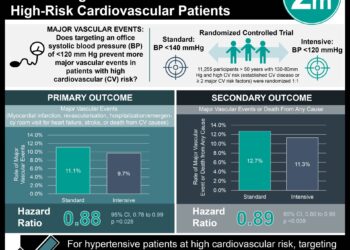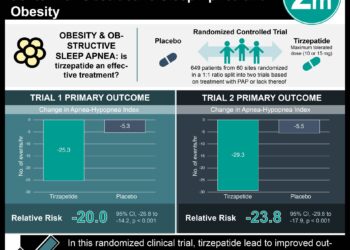Unrecognized obstructive sleep apnea increases risk of postoperative cardiovascular events
1. In this prospective cohort study, severe but not moderate, unrecognized obstructive sleep apnea was associated with increased postoperative cardiovascular events in patients undergoing major non-cardiac surgery.
2. Mean cumulative oxyhemoglobin desaturation less than 80% during the first 3 postoperative nights was longer in those with cardiovascular complications.
Evidence Rating Level: 1 (Excellent)
Study Rundown: Obstructive sleep apnea (OSA) is associated with an increased risk of hypertension, myocardial ischemia, heart failure, arrhythmias, stroke, and sudden cardiac failure. However, there is uncertainty on whether unrecognized OSA adversely affects postoperative outcomes. In this prospective cohort study, severe but not moderate, unrecognized OSA was significantly associated with increased postoperative cardiovascular events in patients undergoing major non-cardiac surgery. Mean cumulative oxyhemoglobin desaturation less than 80% during the first 3 postoperative nights was longer in those with cardiovascular complications. Further, anesthesia, postoperative opioids, and supplemental oxygen therapy did not change risk in patients with OSA for perioperative outcomes.
Overall, this study suggests that severe, unrecognized OSA likely puts surgical patients at risk of worse cardiovascular outcomes, though this study has some limitations. This study did not utilize electroencephalogram recordings in the preoperative sleep studies and may have underestimated the severity of OSA. Further, over half of the study population was ethnically Chinese, and so the findings may not generalize to other populations that are not predominantly Chinese due to potential differences in body mass index and craniofacial anatomy.
Click to read the study, published today in JAMA
Relevant Reading: Prevalence of sleep-disordered breathing in the general population: the HypnoLaus study
In-Depth [prospective cohort]: The Postoperative Vascular Complications in Unrecognized OSA (POSA) study was a multicenter, prospective cohort study of at-risk patients without prior OSA diagnosis that underwent major non-cardiac surgery (intraperitoneal, major orthopedic, or vascular) in 8 hospitals in 5 countries from January 2012 and July 2017 with follow-up until August 2017. A preoperative, overnight sleep study was either conducted at home within the preceding month (34.1%) or in the surgical ward on the night before surgery (65.1%). A high-resolution pulse oximeter wristwatch was used to monitor oxyhemoglobin saturation. The primary outcome was a composite of myocardial injury, cardiac death, heart failure, thromboembolism, atrial fibrillation, and stroke within 30 days of surgery. Secondary outcomes included unplanned endotracheal intubation or postoperative lung ventilation, readmission to the intensive care unit, and infections. Approximately 1218 patients (mean age, 67 years; 40.2% women) were included in the analysis. Severe OSA was associated with increased risk of the primary outcome (adjusted hazard ratio 1.49; CI95 1.19 to 2.01). Mean cumulative oxyhemoglobin desaturation less than 80% during the first 3 postoperative nights was longer in those with cardiovascular complications than those without (23.1 vs 10.2 minutes; p < 0.001). Anesthesia, postoperative opioids, and supplemental oxygen therapy did not have any significant interaction effects on post-operative outcomes.
Image: PD
©2019 2 Minute Medicine, Inc. All rights reserved. No works may be reproduced without expressed written consent from 2 Minute Medicine, Inc. Inquire about licensing here. No article should be construed as medical advice and is not intended as such by the authors or by 2 Minute Medicine, Inc.







